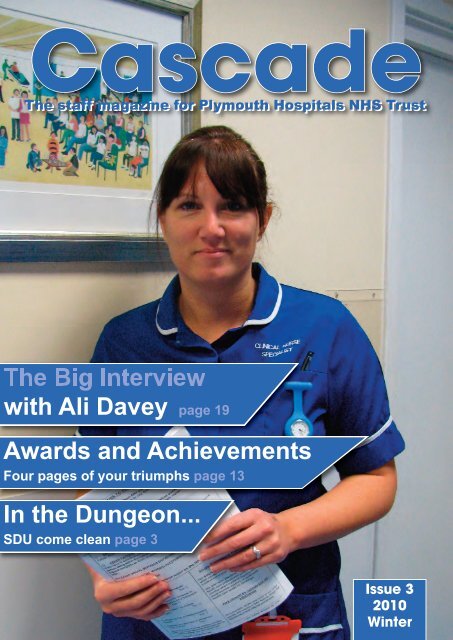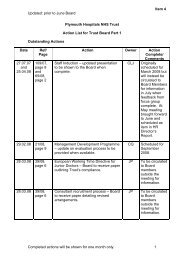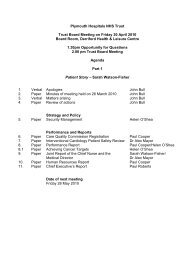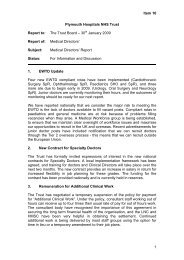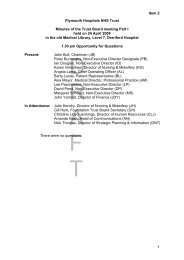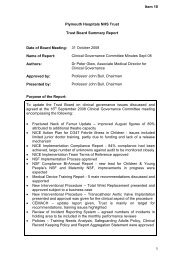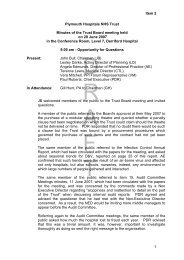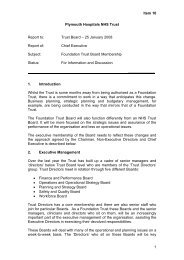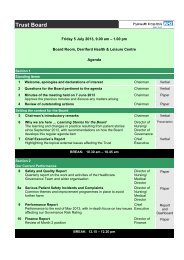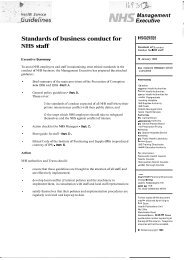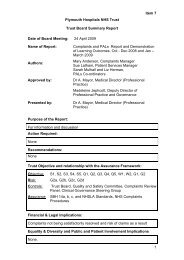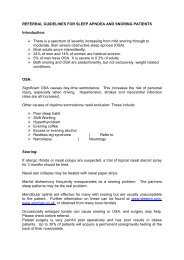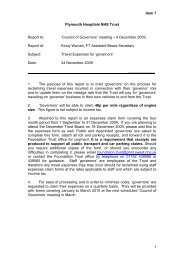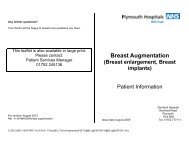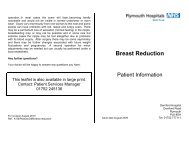Cascade Winter 2010 - Plymouth Hospitals
Cascade Winter 2010 - Plymouth Hospitals
Cascade Winter 2010 - Plymouth Hospitals
Create successful ePaper yourself
Turn your PDF publications into a flip-book with our unique Google optimized e-Paper software.
The staff magazine for <strong>Plymouth</strong> <strong>Hospitals</strong> NHS Trust<br />
with Ali Davey<br />
Awards and Achievements<br />
Four pages of your triumphs<br />
In the Dungeon...<br />
SDU come clean<br />
Issue 3<br />
<strong>2010</strong><br />
<strong>Winter</strong>
Message from the Editor<br />
Welcome to this, slightly later then planned, jam-packed edition of <strong>Cascade</strong>. Featuring news and<br />
articles from right across the Trust there’s something for everyone!<br />
<strong>Cascade</strong> is reliant on monies raised through advertising to fund its production, in these challenging<br />
financial times we were unable to secure the necessary revenue to enable us to print the usual amount<br />
of magazines. Rather then use valuable Trust funds the Communications Team took a decision to<br />
issue the magazine electronically and to supply printed copies on an as requested basis. If you would<br />
like a printed version of the magazine, for your staff room etc. please email<br />
kim.cazaly@phnt.swest.nhs.uk with your name, the number of copies required and your location.<br />
I hope you enjoy reading this edition of <strong>Cascade</strong>. I would love to hear from you, so let me know what<br />
you are doing, what you are acheiving or how you are fundraising and I’ll do my very best to<br />
accommodate your stories.<br />
Kim Cazaly, Editor<br />
Contents<br />
In the Dungeon<br />
Find out more about the work of the Sterilisation and Disinfection Unit<br />
News from around the Trust<br />
4 - 9<br />
Alcohol Awareness Day; Doctors’ Assistants; Healthy <strong>Plymouth</strong>; Associate Artists;<br />
Project Search; Pathology Goes Lean; Transport Team; Cycle Derriford; Electronic<br />
Blood Tracking; Medical Device Link Practicioners; AHP Leadership Challenge;<br />
Sharing Expertise<br />
10 - 11<br />
Major Incident Exercise; Health Tsar Visit; Learning at Work Day<br />
Staff Fundraising 12 - 13<br />
Awards and Achievements 14 - 17<br />
The Early Bird Diabetes Study 18<br />
The Big Interview: Ali Davey 19<br />
Counter Fraud Awareness 20<br />
Energy Efficiency on the Agenda 21<br />
Around the World Update!<br />
22 - 23<br />
Masanga; Malta; Operation Hernia in Ecuador<br />
Retirements 24<br />
In Memory 25<br />
3<br />
2
In The Dungeon<br />
by Peter Heard, Head of Department SDU<br />
Toiling day and night below the Emergency<br />
Department are more than 100 hard working souls<br />
who bring you all manner of sterile goods<br />
wrapped in that fetching purple or blue wrapping.<br />
The Sterilisation and Disinfection Unit’s (SDU)<br />
business is decontamination. Decontamination is<br />
the term used to describe a combination of<br />
processes, including cleaning, disinfection and/or<br />
sterilization. Together, these processes can render<br />
reusable medical devices safe from contaminants.<br />
Success in decontaminating medical devices is<br />
dependant on the successful completion of each<br />
stage of what is referred to as the<br />
decontamination lifecycle. This cycle stretches<br />
right from the purchasing decisions used to<br />
acquire a medical device through to its eventual<br />
disposal.<br />
To ensure equipment is treated in the correct<br />
manner we have to:<br />
• Have effective, tight administrative processes<br />
– this is essential to make sure instruments are<br />
inventoried and to control the decontamination<br />
process.<br />
• Track and trace instruments, in the first<br />
instance you need to know where your sets are<br />
and second who they have been used on.<br />
Tracing surgical instruments to sets is vital so<br />
there is no migration of equipment between<br />
instruments sets.<br />
• Have a quality system in place to deal with any<br />
bugs in the system!<br />
Sin ce 1997 we have received external funding to<br />
upgrade the SDU, providing a Clean Room to<br />
international standards and upgrading washers,<br />
disinfectors and sterilisers to comply with national<br />
standards. To be able to place our product on the<br />
market, SDU has to be registered under the<br />
Medical Devices Directive EEC 93/42. This allows<br />
us to offer our services to the health industry and<br />
manufacturers; at present there over 80<br />
establishments outside of Derriford Hospital that<br />
use the SDU sterile services, providing income for<br />
the Trust.<br />
• Improvements in the buildings and<br />
environment with improved lighting and an<br />
increase in production capacity.<br />
• Clear lines of accountability. Consistency in<br />
who we are responsible to (ISO 13485:2003)<br />
SGS (External Audit) and MRHA the outside<br />
bodies and Internal NHS Risk Management,<br />
Care Quality Commission and others all<br />
intended to keep up the SDU standards.<br />
• Our yearly customer satisfaction survey helps<br />
us improve standards and allows us<br />
to action any suggestions for service<br />
improvements.<br />
• Comprehensive technician training to NVQ<br />
level and higher if appropriate.<br />
The SDU process some 600 instruments set per<br />
day and 700 separate instruments each day.<br />
Running 24 hours a day weekdays and eight<br />
hours a day at weekends, this highly regulated<br />
service, staffed by<br />
very dedicated and<br />
experienced people,<br />
is the largest sterile<br />
services unit in the<br />
south west.<br />
Over the past two years there has been<br />
• Improvements to training and education with<br />
National Decontamination online training.<br />
3
News from around the Trust<br />
Alcohol Awareness Day<br />
Staff Nurse Vanessa Pritchard and Louise Dunn,<br />
Alcohol Hospital Liaison practitioner held an<br />
alcohol awareness day on Monday 12th July, in the<br />
main entrance of Derriford Hospital. In the six<br />
months prior to the event Vanessa undertook ‘the<br />
recognition and management of drug and alcohol<br />
problems’ course in Exeter which has enabled her<br />
to gain a greater insight into drug and alcohol<br />
problems, which can now be applied to her clinical<br />
practice, the course also raised Vanessa’s<br />
awareness of the dangers of alcohol.<br />
The Department of Health states that over a<br />
quarter of the adult population in England (nine<br />
million adults) drink above the Government guidelines. The guidelines being 3-4 units a day for a man<br />
and 2-3 units a day for a woman, a pint of 5% lager = 2 units, while one 175ml glass of wine = 2 units.<br />
Vanessa said: “It’s so easy to exceed your units by having a glass or two of wine a day, and by doing so<br />
you are more likely to develop high blood pressure, heart disease, strokes and some forms of cancer.<br />
Since 1997, the NHS admission for alcohol related illness has doubled, so the main aim of the day was to<br />
raise the awareness of alcohol, the dangers, provide screening tools and generally provide education and<br />
support for anyone who feels they would like to reduce their alcohol intake.”<br />
Doctors’ Assistants Represent Innovative New Approach to<br />
Patient Care<br />
<strong>Plymouth</strong> <strong>Hospitals</strong> NHS Trust is one of only two<br />
NHS trusts in the UK to employ Level 3 Healthcare<br />
Assistants in the role of ‘Doctors’ Assistants’. The<br />
Doctors’ Assistants are deployed by the Department<br />
of Orthopaedics and their role involves performing<br />
certain tasks such as venepuncture, cannulation,<br />
catheterisation, vac dressings and a host of<br />
competency based orthopaedic skills that assist the<br />
Senior House Officers.<br />
The idea for the Doctors’ Assistants came from Mr<br />
Mark Westwood, Consultant Orthopaedic Surgeon<br />
and together Sue Timmins and Amanda<br />
Cole-Quarrell, Orthopaedic Matron, brought this innovative post into being. There are currently 3.5<br />
whole-time equivalent members of staff working as Doctors’ Assistants within the Orthopaedic<br />
Directorate, with one assigned to each orthopaedic ward. The Doctors’ Assistants also cover all<br />
orthopaedic outliers at the Trust. They are managed by Sue Timmins, who is presently auditing the<br />
monthly workload and together with Mr Westwood hopes to show correlations between the effective<br />
services undertaken and reduced discharge delays.<br />
Sue Timmins said: “We have already received many positive comments from patients about the care that<br />
they have received from the Doctors’ Assistants. We have also received very positive feedback from ward<br />
staff and we are hoping that the project will be expanded and developed further.”<br />
4
Healthy <strong>Plymouth</strong> Event<br />
Staff from <strong>Plymouth</strong> <strong>Hospitals</strong> NHS Trust joined<br />
colleagues from NHS <strong>Plymouth</strong> and representatives<br />
from the Local Involvement Network (LINk) at the<br />
Healthy <strong>Plymouth</strong> Event in the City Centre on<br />
Saturday 9 October <strong>2010</strong>.<br />
Representatives from the Trust’s Infection<br />
Prevention and Control Team were on hand to<br />
share and celebrate the reduction in Health Care<br />
Associated Infections at the Trust and to share<br />
information on how they manage outbreaks of D&V,<br />
particularly during the winter period.<br />
The Team also took along their their glo box to<br />
demonstrate the importance of good hand hygiene,<br />
allowing members of the public to discover just how<br />
clean (or not!) their hands are!<br />
Also in attendance was one of the Trust’s Learning<br />
Disability Liaison Nurses who provided information<br />
on her role within the hospital and also staff from<br />
Patient Services who were interactively capturing<br />
people’s thoughts on what matters most to patients.<br />
ASSOCIATE ARTISTS<br />
Simon Ryder<br />
Photography & Video<br />
(image of a rhubarb leaf<br />
made using a nuclear<br />
medicine scanner)<br />
Simon Ripley<br />
Printmaker<br />
(image printed directly<br />
from a gingko leaf)<br />
“We are funded by the Arts Council and will<br />
be working with staff and patients throughout Derriford Hospital<br />
over the next year, organising workshops, exhibitions and a staff arts clubs,<br />
whilst producing new work for permanent display in the hospital. We bring very<br />
different skills to this job: Simon Ryder works digitally, using the equipment he finds<br />
around him; whilst Simon Ripley uses traditional printing skills to engage everybody in the<br />
creative process of image making. If you would like us to visit your department and get involved<br />
in this project, or just be kept informed of our activities, then visit www.zestarts.org.uk”<br />
5
News from around the Trust<br />
Project Search<br />
Derriford Hospital staff are making a life changing difference by<br />
supporting young adults with learning disabilities to experience<br />
working life and move them closer to paid employment as part of<br />
Project Search. Staff, including some from Serco, are providing work<br />
placement opportunities, known as rotations, to eight young people in a<br />
wide variety of hospital settings.<br />
Human Resources Officer for Equality and Diversity, Jayne Middleman,<br />
the business lead for Project Search, has been overwhelmed by the<br />
support from staff saying: “Our staff have reported gaining as much from<br />
the interns as they have from the rotation. It’s proving to be an exercise in<br />
inclusion that has produced dividends in many ways.”<br />
In the first ten weeks intern Jevan Bartlett has proved himself to be eminently<br />
employable as a patient porter following his experience in Imaging under the<br />
guidance of Michelle Rowe, who was one of the first managers to embrace<br />
this initiative. Commenting on his work experience Jevan said: “I had only<br />
been there two or three weeks, when I felt like one of the team. I want to<br />
thank all the staff who have helped me understand the way the department<br />
works and the needs of the patients. I hope after being on the Project Search<br />
course to get a paid job in the hospital.”<br />
Project Search started in the USA 15 years ago and is now active in 14<br />
areas of the UK. The four <strong>Plymouth</strong> partners are Derriford Hospital, City<br />
College <strong>Plymouth</strong>, Pluss and Serco. Following a recent visit from Project<br />
Search, UK lead, Anne O’Bryan wrote: “I really enjoyed getting to know<br />
everyone and seeing how much you have accomplished in your first<br />
term. Your progress is excellent and I look forward to hearing (and seeing)<br />
your developments over time.”<br />
Pip Critten, Pluss Employment Advisor, has praised Derriford and Serco<br />
staff’s commitment to the young people’s success. “It can be quite daunting<br />
working with an adult with learning disabilities for the first time but, without<br />
exception, the managers and mentors have given 100% which has made this<br />
an inclusive and positive experience for everyone.”<br />
As part of Project Search, interns are completing a vocational qualification with<br />
City College <strong>Plymouth</strong>. College tutor, Zenta Zubka-Hill has been impressed<br />
with the commitment of Derriford staff from the outset: “Everyone within the<br />
hospital has been so supportive of the project, the interns and project staff.<br />
They have freely given their time to improve the interns’ experience.”<br />
An intern’s mother commented: “He’s much more outgoing and confident, talks more and has made<br />
friends in the group. Other people have noticed too.”<br />
Feedback has been extremely positive with Derriford Hospital Chief Executive, Paul Roberts saying: “It’s<br />
fantastic to have the interns coming to work at the Trust and it is great to work in partnership on this<br />
initiative.”<br />
The interns are currently looking towards their second rotation, where they can further build on the skills<br />
that Derriford staff have helped them develop.<br />
6
Pathology Goes LEAN<br />
With increasing pressure to save money<br />
within the Trust, Staff in Derriford Combined<br />
Laboratory have been focusing on improving<br />
the many processes that take place on a<br />
day-to-day basis within the department. The<br />
aim is to increase productivity, eliminate waste<br />
and, ultimately, improve the service that we<br />
provide to our users. We have already made<br />
a lot of progress in this area by implementing<br />
LEAN work practices following the 5S training<br />
sessions provided by Steve Mumford and the<br />
productive ward programme team.<br />
Recently, the laboratory has been working in<br />
conjunction with Roche Diagnostics Ltd on a<br />
process mapping project. This has seen staff<br />
from each area of the laboratory look at the<br />
tasks they undertake. Process mapping is a<br />
tool used to identify, in diagrammatic form, all the steps and decisions that take place within a process;<br />
this can be anything from receiving a telephone call and answering a query to the decisions involved in<br />
reviewing results before authorising and releasing them to service users.<br />
In the first session with Roche, the team were given an introduction to the concept and guidance on how<br />
to construct process maps. With their new skills the team set about recording existing processes,<br />
breaking them down into actions, decisions, delays, movements or transport, storage and filing. The<br />
team was given six weeks to go away and produce 38 maps.<br />
In the second session the team reviewed the completed maps, talking through the processes and<br />
reporting back valuable findings. A brainstorming session was held to determine how to reduce some of<br />
the delays, eliminate errors and focus on the essential tasks that add value to each process. This<br />
session was very productive and generated ideas for efficiency savings.<br />
As part of the project, Roche are evaluating the process maps drawn up by the lab and will provide a<br />
report detailing their findings, making suggestions to help the lab go forward in improving our work<br />
practices.<br />
Transport Team<br />
Back in June a newly formed team<br />
took over responsibility for<br />
organising patient transport. The<br />
team, Debbie Ackland, Kay<br />
Braddon and Maria Smith staff the<br />
phone lines from 8.00am to 8.00pm<br />
and are happy to answer any<br />
queries relating to patient transport<br />
and can be contacted on ext<br />
53511, for urgent requests bleep<br />
0768. The Team works closely with<br />
all wards and departments around<br />
the Trust as well as the service<br />
providers: South West Ambulance<br />
Trust, TAPs , St Johns, Crusader<br />
and <strong>Plymouth</strong> Central.<br />
7
News from around the Trust<br />
Electronic Blood Tracking<br />
by Simeon Green, DCL Operations Manager<br />
Staff working on the Haematology wards based<br />
on Level 8, are currently involved in piloting a<br />
web-based electronic blood tracking and bedside<br />
transfusion management system. The<br />
implementation of this technology started its pilot<br />
phase on Monday 15th November <strong>2010</strong>, which<br />
was also the start of National Patient Safety<br />
Week.<br />
The implementation of this cutting edge system is<br />
the result of a 12 month project involving IM&T,<br />
laboratory staff, transfusion practitioners and<br />
healthcare technology specialists at MSoft.<br />
The procurement was managed by Kath Dennis,<br />
Senior Category Buyer from the Peninsula<br />
Purchasing Supply Alliance and the contract was<br />
awarded to MSoft on behalf of Royal Devon &<br />
Exeter Foundation Trust, South Devon Healthcare<br />
Foundation Trust as well as <strong>Plymouth</strong> Hospital<br />
NHS Trust. This Trust is the first of the three<br />
Trusts to pilot the system.<br />
The electronic blood tracking system will control<br />
access to and from all blood fridges within the<br />
Trust. The bedside transfusion management<br />
system allows each barcoded blood unit to be<br />
matched with the patient’s barcoded wristband.<br />
Staff will use a combination of handheld devices<br />
and computers on wheels at the patient’s bedside.<br />
In keeping with National Patient Safety Alert<br />
requirements, the MSoft system, BloodHound,<br />
provides further enhanced security and safety by<br />
ensuring that only trained and competency<br />
assessed staff are allowed to access the system.<br />
BloodHound provides positive patient<br />
identification of users and patients as well as in<br />
depth auditing of all bloods across each and every<br />
stage of the tranfusion process – to ensure the<br />
right blood is given to the right patient. In order to<br />
meet Blood Safety and Quality Regulations and<br />
Medicines and Healthcare products Regulatory<br />
Agency compliance each transfusion record,<br />
includes evidence that each unit has been stored<br />
correctly along with it’s final fate. These records<br />
will be kept for the regulatory requirement of 30<br />
years.<br />
It has taken the project team only seven months<br />
to get from awarding MSoft the contract to the<br />
implemention of the pilot. To enable this to be<br />
done, the team were dependent on other projects,<br />
mainly barcoded patient wristbands and barcoded<br />
staff ID badges being rolled out ahead of the<br />
blood tracking project.<br />
Catherine Murphy,<br />
Senior IM&T Project<br />
Manager and her<br />
colleagues in IM&T<br />
have provided<br />
excellent support<br />
throughout the project.<br />
Level 8 ward staff are<br />
now working hard to<br />
test and adapt the<br />
system as well as their<br />
working practices prior<br />
to it piloting in Mount<br />
Gould in early<br />
January. Once this<br />
system has been<br />
proven at one of our<br />
remote sites, we will<br />
commence the roll out. The next phase of the<br />
project will involve the wards in the remainder of<br />
the Tower block above Level 8.<br />
Should you have any queries relating to the new<br />
system or would like the opportunity to view the<br />
system please contact:<br />
Greg Malcolmson, Nicky Pethic and Cathy Hall on<br />
extension 31487<br />
Amanda Keane on extension 52404<br />
8
Medical Device Link<br />
Practitioners Set Sail at the<br />
Mountbatten Centre<br />
The Mountbatten Watersports & Activities Centre was the<br />
venue for a study day for Medical Device Link<br />
Practitioners. The day was open to all staff who perform<br />
the essential role of Medical Device Link Practitioner.<br />
The day was started by Karen Grimshaw, Director of<br />
Nursing, who spoke about why training on medical devices<br />
is such an important issue for the Trust. There then<br />
followed many interesting sessions looking at topics<br />
including clinical skills training and what a Care Quality Commission inspection will mean for clinical staff.<br />
Jonathan Plumb, Nursing Advisor for the Medicines and Healthcare Products Regulatory Agency (MHRA)<br />
provided an interesting session describing the work of this important government agency. Andy Flood,<br />
Project Lead for NHS Training for Innovation E4e Programme, described the progress being made to<br />
develop national e-learning training for medical devices.<br />
In the afternoon there were practical sessions. Kirsty Bowden, training rep for KCI, did a workshop on the<br />
VAC wound closure system, with delegates able to carry out dressings on each other! Ellsa Mealing,<br />
Assistant Practitioner in MEMS, then conducted an unusual exercise involving suction equipment. Each<br />
table were given a box of suction components and a list of what parts were needed to assemble it<br />
correctly. A competition was then held between the tables for the first group to assemble the equipment<br />
correctly and have it in working order – the prize was a home-made cake provided by Ellsa. It was an<br />
enjoyable exercise that brought home a serious subject to the delegates, showing them it may not be as<br />
easy as they assumed. The day finished with a look at reporting incidents with medical devices, delivered<br />
by Craig Bibby for the Trust. It concluded the day by giving delegates a reminder of the importance of<br />
medical device training to the safety of patients. The day was evaluated highly by those attending, and it<br />
is hoped to follow it up with another date in 2011. Jacqui Connell (Education & Development Practitioner)<br />
is very grateful to her colleagues on the Clinical Skills Team, Sue Frost and Louise Walker, for their<br />
assistance with the day and to the various reps who supported the event financially.<br />
Allied Health Professional (AHP)<br />
Leadership Challenge<br />
Congratulations to physiotherapist Donna Pike and<br />
dietician Vicky Chudleigh for being part of the team that<br />
won the Allied Health Professional Leadership Challenge<br />
<strong>2010</strong> which took place in July. Donna led the team and<br />
both Donna and Vicky were described as having<br />
contributed significantly to the team’s success!<br />
Ten teams from the South West region initially competed<br />
in a two day AHP leadership challenge in June to represent the region at national level. The principal aim<br />
of the leadership challenge was to give AHPs an opportunity to recognise their existing leadership skills<br />
and to identify further development needs, empowering them to take on leadership roles in the future and<br />
therefore enhance the quality of healthcare delivered in the region.<br />
Assessment of the teams’ performances was based on the NHS Leadership Qualities Framework. The<br />
dimensions that featured most prominently were: collaborative working, effective and strategic<br />
influencing, intellectual flexibility and political astuteness. Feedback from the assessment process was<br />
given to each team individually by their assessor.<br />
9
Sharing Expertise<br />
Major Incident Exercise:<br />
Responding to a Chemical Incident<br />
Staff from Derriford Hospital participated in a mass<br />
decontamination and lockdown live exercise on 30th June<br />
<strong>2010</strong> to test hospital and multi-agency plans. Over the last<br />
year, Emergency Department nursing staff have been trained<br />
in the use of personal protective equipment and erecting the<br />
decontamination tent – much to the amusement of staff<br />
observing the ‘bouncy castle’ while waiting for the park and<br />
ride bus. However, this equipment is essential to the safety<br />
of our staff and care of patients in the event of a chemical<br />
incident.<br />
As part of the exercise, our Emergency Department staff<br />
received ‘contaminated’ casualties, assisted them in<br />
undressing and getting into the glamorous orange suits, prior<br />
to entering the decontamination facility. Having progressed through decontamination the casualties<br />
re-dress in green re-robe suits, before exiting the tent and are now recognisable as being clean. As<br />
with any similar incident, the major incident control room was established, with senior staff<br />
co-ordinating the associated impact upon the hospital. As the exercise developed, support was<br />
requested from Estates, Security, Serco, clinical teams and others, to minimise the potential spread of<br />
contamination and impact upon patient services. Due to the number of ‘casualties’ involved, the<br />
emergency services also were deployed, bringing with them their mass decontamination kit, to manage<br />
greater numbers of people presenting at the hospital. A triage nurse was also deployed at the exit to<br />
the mass decon structure, to ensure that no-one had clinically deteriorated during the process.The<br />
hospital decontamination tent was erected within six minutes – a fantastic achievement undertaken in<br />
record time. Lockdown of the Emergency Department was also achieved well within the required 15<br />
minutes. Elsewhere Security and Portering staff were briefed on the cordon requirements at key points<br />
in the hospital, to minimise the movement of people around the affected areas.<br />
Everyone involved undertook their role seriously and genuinely appeared to enjoy participating.<br />
Leadership and real teamwork were demonstrated throughout the exercise, with good humour<br />
maintained in response to the ever-changing challenges presented. The whole exercise certainly<br />
tested key elements of our plans and provided a great opportunity for us to work with the emergency<br />
services and other agencies, who would be involved in an actual chemical incident response.<br />
A big thank you and well done to everyone involved.<br />
Miriam Smith, Emergency Planning & Liaison Officer<br />
The MERIT Team also participated in a exercise on Dartmoor<br />
with the Dartmoor Rescue Group in early July. This enabled the<br />
team to gain experience in working in the pre-hospital setting<br />
with other agencies. A casualty clearing station was established<br />
and some members of the team were called forward to assist in<br />
the care of casualties nearer to where their 'injuries' were<br />
sustained. Again this exercise proved a very useful opportunity<br />
to put into practice skills developed on training courses, with<br />
different challenges than those normally experienced within a<br />
hospital major incident response setting.<br />
10
Health Tsar Visits Pioneering<br />
<strong>Plymouth</strong> Diabetes Service<br />
Dr Rowan Hillson MBE, National Clinical Director<br />
for Diabetes at the Department of Health, visited<br />
<strong>Plymouth</strong> on Thursday 20th May to speak to local<br />
health professionals about the innovative diabetes<br />
services that they provide in the city. Dr. Hillson’s<br />
time in <strong>Plymouth</strong> involved a visit to Derriford<br />
Hospital to meet the team dealing with both<br />
inpatients and outpatients with diabetes, as well as<br />
meeting with health care staff who are responsible<br />
for diabetes care in the community.<br />
<strong>Plymouth</strong> <strong>Hospitals</strong> NHS<br />
Trust is a pioneering site in<br />
the UK for care of patients<br />
with the condition, with a<br />
specialist team onsite who<br />
are solely responsible for<br />
managing patients with<br />
diabetes. The team includes<br />
Nurse Specialists,<br />
Healthcare Assistants and<br />
Consultants, whose job it is<br />
to ensure that patients<br />
suffering from diabetes at<br />
the Trust have their<br />
conditions managed<br />
effectively. This includes<br />
making sure that their<br />
diabetes is properly<br />
controlled by specialists and<br />
that patients are given the<br />
right type and dosage of insulin at the right times.<br />
This minimises the chance of errors being made,<br />
promotes safe and effective treatment and can<br />
reduce a diabetic patient’s length of stay in<br />
hospital. The Trust’s diabetes team are also a<br />
national exemplar for their work in helping to<br />
prepare people with diabetes for surgery so that it<br />
can safely be carried out as a day case procedure,<br />
without needing admission.<br />
A recent audit with NHS Diabetes showed that<br />
<strong>Plymouth</strong> <strong>Hospitals</strong> NHS Trust is performing<br />
extremely well in terms of management of patients<br />
with diabetes. The Trust scored way above national<br />
averages for providing appropriate blood glucose<br />
testing and for the management of patients with<br />
diabetes by specialist teams. Additionally, the<br />
number of prescription and management errors<br />
amongst diabetes patients by the Trust is far below<br />
the national average.<br />
Dr Daniel Flanagan said: “We are very proud of the<br />
diabetes service that we provide here at <strong>Plymouth</strong><br />
<strong>Hospitals</strong> NHS Trust and Dr Hillson’s visit is<br />
testament to the extremely hard work of our staff in<br />
ensuring that the care we prov ide is of the highest<br />
standard.”<br />
Learning at Work Day<br />
The 'Learning at Work Day' is part of the National Adult Learners Week held every year. This year local<br />
training providers were invited along as well as all staff, local companies and members of the public to<br />
come along and see the connections Derriford has with reference to Training amd Learning in <strong>Plymouth</strong>.<br />
The theme this year was 'Creating Connections' and intended to show staff that it is not just us who can<br />
train and guide them in their learning, and that it does not necessarily have to be in conjunction with their<br />
jobs, it may be something quite unrelated, but we recognise the connections in home and work life and<br />
creating the best possible balance.<br />
The day was a resounding success with taster sessions on such things as Indian Head massage and<br />
Forensic and Medical Science.<br />
11
Staff Fundraising<br />
Children in Need <strong>2010</strong><br />
Amongst fundraising activities around the<br />
Trust in aid of Children in Need, the Central<br />
Admin team raised over £1,000! The team<br />
organised a children's TV/film character fancy<br />
dress day, a cake sale and raffle where the<br />
top prize included an Xbox. Perhaps the<br />
most unusual fundraising event was the brain<br />
freeze competition (i.e. who can drink the<br />
slush puppy the quickest!)<br />
The x-ray porterering team also donned fancy<br />
dress and looked quite spectacular moving<br />
around the Trust.<br />
The Marathon Cup Challenge <strong>2010</strong><br />
Eleven teams from around the Trust competed for this year’s<br />
Marathon Cup Challenge. The top five times from each team’s<br />
<strong>Plymouth</strong> Half Marathon were added together, the team with the<br />
best time being named as victors and lifting the sought-after<br />
trophy. This year’s winning team came from the Anaesthetics<br />
department with a combined time of eight hours 35 minutes<br />
and 45 seconds, pictured here receiving the trophy from Chief<br />
Executive Paul Roberts. Wavell Viggers from the Imaging<br />
directorate chalked up the quickest time at one hour 23<br />
minutes and 4 seconds!<br />
The full list of teams who took part this year: Anaesthetics, Cardiothoracics, Chief Executive’s office,<br />
Child Development Centre, Imaging, Intensive Care Unit, Junior Doctors Mess, Maternity, Microbiology,<br />
Neonatal Intensive Care Unit and Trauma.<br />
Hearty congratulations to all who took part, if you’re interested in entering a team in next year’s<br />
competition contact the Press and Communications Office on extension 31240, 31149 or 53300<br />
12
A Marathon Effort by Jo Skelly<br />
Hi, My name is Jo I have worked for the Trust for 16 years, I am a recovery<br />
practitioner based in the main theatres on level 4. In August 2008, I started<br />
experiencing problems with a mild heart arrhythmia. Gradually my symptoms<br />
became much worse until every day was a struggle, eventually in June 2009<br />
my line manager said for my own safety I could no longer work.<br />
Then I was referred to my saviour Mr David Thomlinson, consultant<br />
cardiologist. I remember weeping when he said he could fix my heart, such a<br />
relief. Whilst waiting for my operation I asked to be redeployed as staying at<br />
home drove me mad and<br />
Chestnut<br />
Marathon<br />
Runner<br />
On Sunday 30th May,<br />
Third Year Medical<br />
Student Henry Murphy<br />
ran the <strong>Plymouth</strong> Half<br />
Marathon <strong>2010</strong> on<br />
behalf of the Chestnut<br />
Appeal, in order to<br />
raise awareness of<br />
Prostate Cancer.<br />
Henry ran the 13.1<br />
miles in 1 hour 41 minutes and managed to<br />
double his fundraising target to just over<br />
£300, thanks to the generosity of friends,<br />
colleagues and family.<br />
Marlborough pre-op staff<br />
were wonderful. In<br />
December 2009 I was to be<br />
the first person at Derriford Hospital to have the new<br />
ablation tool. I left the hospital just 24 hours later with<br />
a normal heart rhythm for the first time in 16 months!<br />
I don’t think I realised how poorly I was until I felt<br />
better and I wanted to do something that would say<br />
thank you to the Trust and also give me my<br />
confidence back. So, having never run before, I<br />
decided to run the <strong>Plymouth</strong> Half Marathon for the<br />
Cardiology Deaprtment. On Sunday 30 May I<br />
completed the race in 2 hours 12 minutes – fab!<br />
I would like to thank all my colleagues, friends and<br />
family who have all helped me through one of the<br />
most, if not the most, difficult time in my life. Special<br />
thanks to David Thomlinson and the whole Trust for<br />
making me a new person. Next year under two hours<br />
hopefully!<br />
Chestnut Appeal<br />
The Chestnut Appeal for Prostate Cancer is the only local<br />
prostate cancer charity covering Devon and Cornwall, and the<br />
work we do is unique. We not only provide funding for clinical<br />
nurse specialists; called Chestnut Nurses, but we provide the<br />
latest technology and treatments that are not available on<br />
the NHS.<br />
During <strong>2010</strong> we helped to kit out the Chestnut Unit on<br />
Level 7 with a comfy area, to allow patients a more<br />
relaxing environment to sit in when discussing their<br />
cancer treatments. We also provided funding for a<br />
second Chestnut Nurse, Jane Ripley, who joined the team<br />
and is a welcome partner to Vanessa Wilcox.<br />
As if that wasn't enough we also funded a LuxTec Pro<br />
headlight which gives surgeons the true colour distinction<br />
needed in surgery and is in use by the prostate cancer team, in particular with keyhole procedures.<br />
All of this support costs money and without support from people like yourselves we would not be able<br />
to continue this work in the region. If you would like to find out more about the charity or lend a hand<br />
please pop in and see us on Level 6, next to Tavy Ward or check out our new and improved website<br />
www.chestnutappeal.org.uk<br />
13
Awards and Achievements<br />
Credit for Critical<br />
Care Skills<br />
On May 19th Sharon Russell,<br />
Partnership Manager,<br />
presented certificates at a<br />
ceremony held at the Postgraduate<br />
Medical Centre, for<br />
cohort 15 and 16 students who<br />
have recently completed the<br />
Level One university<br />
partnership module for caring<br />
for the critically ill adults in<br />
acute care areas, gaining the<br />
extra re-validated 40 credits.<br />
The course was designed in 2001 by Su Jameson, Module Leader, Julie Hendry, former Module leader,<br />
and Christina Quinn, Associate Director of Workforce, along with clinical staff across the Trust and<br />
peninsula. Over 280 staff have completed the course, gaining academic credits and certificates of<br />
competence. The course, which is designed for registered practitioners to recognise and manage the<br />
critically ill adult in acute care areas, is run over 12 days (one day a week) with six days theory based<br />
and six days practice based. Learning is achieved through many teaching strategies including lectures,<br />
role play, practical scenarios, small group work, problem solving, reflection and the chance to work in<br />
other acute clinical areas to enhance their learning.<br />
In order for the students to gain 40 academic credits they have to complete observed scenario clinical<br />
examinations (OSCE), competencies, 2500/3000 word academic assignment critiquing a patient<br />
scenario and a presentation.<br />
Outstanding Foundation Doctors<br />
Awards were recently presented to Outstanding<br />
Foundation doctors (for training year 2009/<strong>2010</strong>) who were<br />
nominated by their peers and consultant colleagues.<br />
The awards were given to trainees who have gone above<br />
and beyond the requirement of their foundation training.<br />
Outstanding F1 was awarded to Helen<br />
Grimsmo-Powney<br />
Outstanding F2 was awarded to Rachel Clancy, with a highly<br />
commended F2 award for Laura Dunn.<br />
The doctors were presented their certificates by Dr Hiu Lam,<br />
Director of Medical Education and the outstanding award<br />
winners have had their names added to the awards board in<br />
the main concourse in the Postgraduate Medical Centre.<br />
14
<strong>2010</strong> Technologist Award for Services to<br />
Nuclear Medicine<br />
At the spring meeting of the British Nuclear Medicine Society (BNMS) held<br />
in Harrogate, Sally Farrell received the ‘<strong>2010</strong> Technologist Award for<br />
Services to Nuclear Medicine.’ Sally currently works as a Consultant<br />
Technologist in Nuclear Medicine at Derriford and is the first technologist<br />
in the country to achieve consultant status. Sally has been a member of<br />
the BNMS Technology Group Council since 2002 and secretary since<br />
2004. The award was presented at the conference dinner by Dr Gill<br />
Vivian, President of the BNMS, where Sally was described by the Chair of<br />
the Technology Group ‘as the glue that holds them together.’<br />
Before coming to Derriford, Sally was superintendent radiographer in<br />
Exeter and gained an MSc in 2001. She travels to council meetings in<br />
London in order to raise technologists’ issues and education at a national<br />
level. Other special interests include non-medical reporting and sentinel<br />
node imaging. Well done Sally much deserved!<br />
Medal Presentation<br />
Sargeant Holly Chambers and Warrant Officer 2<br />
Adam Roy were presented with their Afghanistan<br />
medals on Tuesday 30th November <strong>2010</strong> by Air<br />
Vice Marshall Morris.<br />
WO2 Roy served in Afghanistan between March<br />
and June <strong>2010</strong> in the role of Officer in Command<br />
of an X-ray Department. He has now returned to<br />
work alongside his civilian and military<br />
colleagues in the x-ray department at Derriford<br />
Hospital.<br />
Sgt Holly Chambers deployed to Afghanistan between July and October<br />
<strong>2010</strong> as the Deputy Aeromed Liaison Offiger (DAELO) and since<br />
returning she has resumed her role as an intensive care nurse in the<br />
Intensive Therapy Unit.<br />
Outstanding Educational Supervisor<br />
Every year an award is presented to the outstanding foundation<br />
programme educational supervisor. This award is presented to<br />
the educational supervisor who has the best feedback from the<br />
trainees.<br />
This year the award has been presented to Dr Sarah Rawlinson<br />
by Dr Hiu Lam, Director of Medical Education.<br />
15
HCA City and Guilds Level 2 Awards<br />
Congratulations to the first group of Health Care Assistants who have completed the “City and Guilds<br />
Level 2 Award in the Prevention and Control of Infection”. This three month course was run by Practice<br />
Education in collaboration with the Infection Prevention and Control team. Well done to Lucy Greer,<br />
Sherone Jones, Jackie Wheeler, Anna Cowler, Kirsty Proctor, Dan James, Tracey Tapper, Dee<br />
Holbrook, Linda<br />
Knowles, Christine<br />
Taylor, Alison Johns<br />
and Rachel Head who<br />
have all successfully<br />
completed the course.<br />
If you would like<br />
information about this<br />
course please contact<br />
Lynn Sugg on ext<br />
55167<br />
Congratulations Karen!<br />
Congratulations to Karen Jones, formerly<br />
of the Post Room, who has recently<br />
started in her new role as medical<br />
secretary in the Histopathology<br />
department. Karen, who has been at the<br />
Trust for five years, has been studying<br />
towards her Medical Secretary Diploma in<br />
her spare time passing some modules<br />
with distinction.<br />
Talking about her new role Karen said: “I’m going to miss the post team and rapport we all have, the<br />
support they have given me is incredible. I’m looking forward to the challenge of my new role and a<br />
change of uniform!”<br />
16
Awards and Achievements<br />
Rachel Wins First Prize<br />
Dr Rachel Clancy, FY2 doctor at Derriford Hospital was recently awarded first prize for her presentation<br />
on Day Case Breast Surgery at the Annual Meeting of the British Association of Day Surgery held in<br />
Portsmouth. Her presentation was entitled “Wide local excision and sentinel node biopsy for breast<br />
cancer – feasibility of day case surgery” and was based on work done by Mr Roger Watkins,<br />
Consultant Surgeon in the Primrose Breast Care Centre.<br />
Over the last three years a very successful day case pathway has been developed for patients<br />
requiring breast conservation surgery for breast cancer. In addition to the excision of their breast<br />
cancer, patients undergo the removal of one or more lymph nodes from the axilla on the affected side.<br />
Any drains inserted at the time of surgery are removed prior to<br />
discharge home. No unplanned re-admissions in the<br />
port-operative period were noted. Previously such patients had a<br />
one to two night hospital admission.<br />
Previous work, which incorporated a patient satisfaction survey,<br />
was presented in November 2009 at the Association of Breast<br />
Surgery Annual Scientific Meeting in London and had shown that<br />
the day case pathway was very acceptable to patients. Over the<br />
last twelve months the number of patients successfully completing<br />
the day case pathway has increased significantly. Additional<br />
developments are planned to improve the pathway still further.<br />
<strong>Plymouth</strong> Core Midwives nominated for Team of the Year<br />
Every year the Royal College of Midwives make five awards nationally and many hospitals enter the<br />
different categories to try and win a prestigious award.<br />
Angela Roberts, Maternity Midwife, nominated the Core Delivery Suite midwives for the team of the<br />
year award for our team work and combined hard work in implementing and rolling out the Triage<br />
system now in place on delivery suite.<br />
Having written a supporting nomination paper the team recently found out that they had been short<br />
listed from many larger hospitals to the final three. Angela and Kate Bickerstaffe were invited to London<br />
to give a short presentation on behalf of the team to support our nomination for the award and the<br />
results will be announced in London in January. The winners will accept the award from H.R.H Princess<br />
Anne or the current Secretary of state for health.<br />
Speaking after the news that they had been shortlisted Angela<br />
said “This is such a huge thing for <strong>Plymouth</strong> Midwives as we<br />
were up against big sexy teaching hospitals and to get down to<br />
the final 3 is amazing in itself. Kate and I have presented locally<br />
but never on the National stage before. It was a great<br />
opportunity to showcase <strong>Plymouth</strong> and what we do.”<br />
17
The Early Bird Diabetes Study<br />
Now in its 11th year, the EarlyBird<br />
Diabetes Study is investigating factors<br />
in modern day childhood that lead to<br />
diabetes and metabolic disease.<br />
EarlyBird is an National Institute of<br />
Health Research (NIHR) portfolio<br />
study, carried out by a research team<br />
from the Peninsula Medical School, but<br />
hosted by Derriford hospital.<br />
What’s the problem?<br />
In the UK, one person is diagnosed<br />
with diabetes every three minutes and<br />
three die from its cardiovascular<br />
complications every hour. A disease<br />
that a generation ago was regarded as<br />
‘maturity-onset’ now afflicts children. If<br />
the present trend continues one in five of<br />
our grandchildren will become diabetic during their<br />
lifetime.<br />
The problem is insulin resistance, which underlies<br />
not only diabetes but also heart disease, blood<br />
pressure, high cholesterol, stroke and even<br />
infertility - together referred to as the metabolic<br />
syndrome. Insulin resistance, largely driven by<br />
obesity, is the commonest cause of premature<br />
death in the Western World - and one of the most<br />
preventable. An understanding of the factors<br />
responsible will better inform health strategists in<br />
the task of prevention, and childhood must be the<br />
focus for prevention because the process clearly<br />
starts early in life.<br />
What is EarlyBird doing about it?<br />
EarlyBird is trying to establish the ‘Who, When<br />
and Why’ of insulin resistance. Which children are<br />
susceptible, when do they develop it, and what<br />
are the factors responsible? For the last ten years,<br />
from the age of 5 years, some 300 healthy young<br />
volunteers from <strong>Plymouth</strong> schools have been<br />
annual visitors to the EarlyBird clinic where they<br />
undergo a range of sophisticated measurements,<br />
scans and tests. The blood tests are crucial,<br />
because they tell us how far down the road<br />
towards diabetes each child has travelled, and are<br />
helping us piece together the factors responsible.<br />
Three of the youngsters have already become<br />
diabetic and others are not far behind.<br />
The Early Bird Diabetes Team<br />
What has EarlyBird found to date?<br />
Many of EarlyBird’s findings challenge popular<br />
assumption. For example, the average child today<br />
is no heavier than a generation ago. The problem<br />
appears to be largely confined to offspring whose<br />
same-sex parents are obese - a recycling of<br />
obesity from parent to child, irrespective of wealth<br />
or social status. What’s more, the trajectory that<br />
leads to obesity seems to be set well before 5<br />
years (and Jamie Oliver’s school dinners). Focus<br />
on the education of obese parents-to-be could<br />
break the cycle. Crucially important – fatness<br />
leads to inactivity in children, rather than inactivity<br />
to fatness, suggesting that calorie reduction,<br />
rather than physical activity, is key to weight<br />
reduction. Active children are fitter, but activity<br />
does not reduce their weight!<br />
In a recent letter to the EarlyBird team<br />
Professsor Wilkin wrote:<br />
“I want you to know how much impact EarlyBird is<br />
having around the world. The data that is<br />
emerging, which could have real impact on the<br />
way we view childhood obesity, is unique and<br />
Linda and I are immensely proud to be part of it.<br />
We are nevertheless very aware that EarlyBird is<br />
nothing if not your hard work. We may be the<br />
ambassadors, but remain very conscious whose<br />
study it really is.”<br />
18
The Big Interview: Ali Davey<br />
What do you do?<br />
Well, my title is Clinical Nurse Specialist for<br />
Vulnerable Adults. I work in the Emergency<br />
Department looking out for people who could be<br />
deemed vulnerable, such as those with dementia,<br />
anyone with a carer, older people who are alone<br />
and isolated, those with mental health issues,<br />
those who misuse substances.<br />
What is the purpose of your role?<br />
To identify those people who are vulnerable and<br />
make sure that their care plan is about reducing<br />
the risks that they face. A lot of what I do is about<br />
information gathering and sharing with other<br />
agencies such as social<br />
services, the police and the<br />
ambulance service.<br />
How long have you been<br />
doing your job?<br />
Three years in this particular<br />
role.<br />
How did you get into<br />
nursing?<br />
My mum had MS so from an<br />
early age I helped look after her.<br />
When I was 14 the local care<br />
home was looking for someone<br />
to do a few bits and I wanted<br />
pocket money. My experience<br />
caring for mum got me the job and it’s been<br />
nursing all the way ever since.<br />
Ali Davey, pictured right<br />
What is your single biggest achievement?<br />
On a professional level, it’s got to be the work I do<br />
that has been recognised by the Home Office. I sit<br />
on a few partnership forums in the city, working<br />
alongside staff from the police, fire service, the<br />
city council, social services etc.<br />
One of the groups I sit on is called the Crime<br />
Detection and Prevention Partnership. We have<br />
set up the sharing of information in such a way<br />
that it hasn’t cost anybody any money and we are<br />
providing data that other trusts are paying<br />
thousands for. Our system is incredibly flexible<br />
and extremely cost effective. I have been asked to<br />
present on this several times to the Home Office<br />
and they have been to visit us twice. At the end of<br />
February I have been invited to go and present to<br />
government ministers. Yikes!<br />
On a more personal level, getting my band seven<br />
was a personal achievement for me because I got<br />
there in quite a short space of time.<br />
What do you like most about your job?<br />
All of it. I really do. I love it.<br />
What do you like least?<br />
There’s too much work and not enough hours in<br />
the day.<br />
If you weren’t a nurse, what would you be?<br />
Oh, that’s easy – an estate agent for Stags. I’d<br />
drive a really posh car and wear glamorous high<br />
heels.<br />
What is the most important<br />
lesson that you have learned<br />
from life?<br />
Not to judge people. When I was a<br />
student nurse I was on placement<br />
and I drew the short straw – to take<br />
a drug addict for a Picc line into<br />
their neck. When I was sat waiting<br />
with him we got talking. It turned out<br />
that he has lost his dad at an early<br />
age and his mum had not coped<br />
with it at all and she has taken a<br />
series of men in. The last one<br />
severely abused my patient and so<br />
he had run away from home at the<br />
age of 11. I saw him in a totally different light and<br />
that changed my mind about how you respond to<br />
people when you first meet them.<br />
What’s on your Christmas list?<br />
Ummm, perfume would be nice. I always like to<br />
smell nice, it can be really important given some<br />
of the less pleasant and, to be honest, sometimes<br />
smelly places I have to go and visit. But the gift I<br />
want most of all this Christmas is for my three<br />
sons to be at home. The middle one is 18 and in<br />
the army so to have us altogether on Christmas<br />
Day would be wonderful.<br />
Tell us something about yourself that no-one<br />
else would know<br />
Well, I have got into camping a bit and now I<br />
wouldn’t leave home without my SheWee. If you<br />
don’t know what one is – google it. I can highly<br />
recommend them for female campers. I’m a<br />
convert!<br />
19
Counter Fraud Awareness<br />
by Tracy Wheeler, Counter Fraud Officer<br />
I have been the Local Counter Fraud Specialist<br />
(LCFS) for <strong>Plymouth</strong> <strong>Hospitals</strong> NHS Trust since<br />
2003. I report to the Director of Finance and each<br />
year produce a counter fraud work plan which is<br />
presented and monitored by the Audit Committee.<br />
I am responsible for raising awareness of the<br />
types of NHS fraud, investigating any referrals<br />
received and undertaking local exercises in areas<br />
where there are perceived areas of weakness<br />
which may give the opportunity for fraud.<br />
Fraud in the health service diverts valuable<br />
resources from patient care.<br />
Fraud is often seen as invisible crime, hiding<br />
behind descriptions such as “white collar”,<br />
“victimless” and “difficult to prove” but by<br />
dedicating time and resources to combating the<br />
problem an anti fraud culture can be developed<br />
within NHS organisations.<br />
One of the issues we came across within<br />
<strong>Plymouth</strong> <strong>Hospitals</strong> NHS Trust is staff working<br />
whilst off sick. Following LCFS investigations and<br />
by working with the Human Resources Team, the<br />
Trust has now implemented robust procedures:<br />
return to work declarations, updated sickness<br />
absence policy and the introduction of a<br />
secondary employment policy.<br />
Last year the LCFS undertook a local proactive<br />
exercise looking at how good the Trust was at<br />
identifying overseas patients and ensuring that<br />
they paid for their care which is not funded by the<br />
NHS. The non identification of individuals not<br />
entitled to free NHS care and not registered as<br />
private patients meant that the Trust was losing<br />
valuable income. As a result of this exercise the<br />
Trust has now appointed an Overseas Visitors<br />
Officer Chris Pitts ext 37055, who is raising<br />
awareness amongst staff and looking at improving<br />
current systems to identity patients who should be<br />
paying for their treatment.<br />
and hospitality@phnt.swest.nhs.uk) to ensure the<br />
declaration of any conflict of interest or receipt of<br />
hospitality.<br />
The NHS Counter Fraud Service (CFS) has<br />
responsibility for preventing, detecting and<br />
investigating fraud against the NHS and each year<br />
they assess the adequacy of counter fraud<br />
arrangements in NHS Trusts across England and<br />
Wales. For two consecutive years (2008/09 and<br />
2009/10) <strong>Plymouth</strong> <strong>Hospitals</strong> NHS Trust has<br />
achieved the highest level in this assessment –<br />
Level 4 – performing strongly.<br />
There is a NHS Counter Fraud site on <strong>Plymouth</strong><br />
Healthnet which gives details of current risks and<br />
also access to the “Fraud Counts” local<br />
newsletter.<br />
If you would like to receive a fraud awareness<br />
presentation please contact Tracy on 431378 or<br />
tracy.wheeler@pnht.swest.nhs.uk.<br />
Further information on NHS fraud can be found at<br />
www.nhsbsa.nhs.uk<br />
To ensure employees comply with the NHS<br />
Standards of Business Conduct and be impartial<br />
and honest in the conduct of their official<br />
business, <strong>Plymouth</strong> <strong>Hospitals</strong> has introduced two<br />
email addresses (interests@phnt.swest.nhs.uk<br />
20
Energy Efficiency on the Agenda<br />
The Derriford Occupational Therapist (OT) Team<br />
recently received a briefing on the energy efficiency<br />
schemes operating in <strong>Plymouth</strong> to help them identify<br />
people who could benefit from the help that’s<br />
available.<br />
Katie Reville, <strong>Plymouth</strong> City Council’s Home Energy<br />
Assistant attended the OTs team meeting and talked<br />
about the grants and discounts available towards loft<br />
and cavity wall insulation and heating improvements.<br />
Katie commented:“As trusted professionals in the<br />
eyes of their patients, occupational therapists and<br />
other home visiting health professionals can often<br />
encourage people to apply for the help that is<br />
available to them. My aim was to raise the OTs<br />
awareness of the different energy schemes<br />
operating in our area and how to refer people onto<br />
them in the hope that it will increase the uptake of<br />
the grants and discounts.”<br />
The main schemes operating in <strong>Plymouth</strong> include Cosy Devon, which offers free loft and cavity wall<br />
insulation to every homeowner over 60 years old and those on benefits and offers amazing discounts to<br />
everyone else.<br />
There is also the <strong>Plymouth</strong> Healthy Homes scheme that helps homeowners at risk of cold related<br />
illness to make their homes warmer and healthier places to live. The project achieves this by offering<br />
grants towards home insulation, ventilation and heating improvements as well as energy efficiency<br />
advice.<br />
For more information on the grants and schemes available in <strong>Plymouth</strong> and Devon please contact the<br />
Energy Saving Trust Advice Centre on 0800 512012.<br />
New Year New Start - Big Steps for a Smaller Footprint<br />
We need to reduce our carbon footprint, not only to save money but to stop wasting precious<br />
resources. One of the best ways to make a big difference is for each of us to take responsibility for the<br />
environment in a small area of the hospital.<br />
The Trust would like to invite staff members to become environmental champions,<br />
become the person who takes the lead in your area:<br />
• Promoting energy and environmental awareness<br />
• Sharing ideas and dispelling myths about energy and recycling<br />
• Sharing the different ways we can work in a more sustainable way<br />
• Help developing the Trust's Sustainability Plan<br />
• Being part of energy saving events<br />
• Providing feedback to the Environment Manager<br />
• Look for ways to cut down energy costs and stop wasting resources<br />
Interested? Email or call Peggie Johnson on 37011<br />
21
Around the World Update!<br />
Masanga - by Deborah Southon, Radiology Academy Manager<br />
Earlier this year I had the privilege to visit a small hospital in Sierra Leone. The hospital and its<br />
neighbouring village are called Masanga. They are situated in the heart of the country, in the middle of<br />
the jungle; the nearest town is a 40 minute 4x4 ride away on a dirt road.<br />
Masanga was originally a leprosy hospital set up by the Seventh day Adventists in the 1960’s and run<br />
successfully until the civil war. In 2005 the Association of Friends of Masanga Hospital in Denmark took<br />
over the running of the hospital, in full co operation with the Sierra Leone Government and the local<br />
chiefs. Grace’s Fund for Masanga is a UK charity set<br />
up to support this project. In order to get the hospital<br />
working well and to hand it back to the local<br />
population a fair bit of work is still needed.<br />
During the civil war in Sierra Leone, not only were<br />
there massive losses through death, but many were<br />
injured, left orphaned, disabled and displaced. In<br />
Masanga village large extended families share simple<br />
dwellings. There is no running water and little access<br />
to electricity or fuel for generators. Most dwellings<br />
have a small covered shelter nearby where the family<br />
will prepare their food. Masanga is safe and the<br />
people seemed happy; the village has grown as many<br />
ex patients decide to stay on there. Health care is very<br />
limited in Sierra Leone; the health problems and<br />
priorities are different than we face in the west.<br />
What is Grace’s fund doing?<br />
Grace’s fund, with its partners of <strong>Plymouth</strong> Hospital<br />
NHS Trust and the Peninsula Medical School are trying to help to get the buildings and the services like<br />
water, power, sewerage and waste disposal fit for purpose. Then at the same time provide skills training<br />
not only for the hospital staff but for ancillary staff and for businesses to support the hospital economy.<br />
How can you help?<br />
You can donate money to Grace’s Fund, to help us in this work. If you are interested in spending<br />
between 1 and 6 months volunteering on the ground, helping with these schemes?- talk to us.<br />
We would love to find fund raisers to help us raise awareness and apply for grants and awards that<br />
might help. For more information: www.gracesfund.co.uk / www.masanga.dk / www.graceturner.co.uk<br />
Facebook groups – gracesfund for Masanga and Masanga<br />
Malta - by Brian Coniam<br />
I wanted to share my experience and express my<br />
feelings about volunteer work abroad as I have<br />
recently experienced it myself. I always wanted to<br />
go to Malta for a holiday, and whilst planning a<br />
holiday one year, I thought about the idea of<br />
volunteer work in a hospital over there just for the<br />
experience. I talked it over with family and friends<br />
and there were some mixed opinions, some<br />
thought I must be mad to want to go while others<br />
were encouraging, in the end I decided to do it.<br />
Packing all the relevant documentation that I<br />
thought I might need; my certificates etc and<br />
evidence that I work in the hospital and have<br />
sufficient training and experience, I set off for my<br />
Maltese ‘holiday’. After taking a couple of days to<br />
settle into the hotel and finding my way around the<br />
area I caught the local bus and arrived at St Lucks<br />
Hospital. The building is over 500 years old and<br />
the British used it as a hospital during the Second<br />
World War.<br />
22
With a nervous anticipation I approached the<br />
reception area and explained who I was and what<br />
I wanted to do. After a short wait the door to the<br />
main office opened and a tall gentleman<br />
approached me with his hand outstretched ready<br />
to shake my hand and welcome me to the<br />
hospital. He showed me into his office and after a<br />
cup of tea and discussion invited me to join the<br />
team working in outpatients. How pleased I was<br />
with the friendly and warm welcome I received.<br />
The experience I had there was wonderful, all of<br />
the staff were so kind and helpful and really made<br />
me feel like part of the team. I never felt left out or<br />
unsure of myself. I have continued to return to<br />
Malta four years running now. The hospital has<br />
moved to a brand new building that is luxurious<br />
and modern<br />
and a<br />
pleasure to<br />
work in, and<br />
not only is<br />
the work<br />
experience<br />
side a great<br />
joy I have<br />
also made some dear friends along the way who I<br />
meet up with on my return and spend my weeks<br />
with.<br />
For any of you contemplating volunteer work<br />
abroad my advice is to go for it, it’s one of the best<br />
things I have ever done and hope to continue to<br />
do for many years to come!<br />
Operation Hernia in Ecuador – by Deidre Glackin<br />
On our first visit to the Hospital Padre Damian in La Independencia, Ecuador, we encountered a very<br />
good sign. As Samuel Shillcutt, our organization liaison or “fixer,” was leading us on a tour of the<br />
multi-building, rudimentary space, we ran into Jovita, the head nurse. There she was crouched in the<br />
dressing room of the Operating Theatre, dressed in jeans, flip-flops and paint spatters, with a brush in<br />
her hand, laying a new coat of paint on the locker doors . . . on her day off. The people we encountered<br />
in Ecuador were the heart of this adventure. Their sense of pride in community and “make-do” attitude<br />
are certainly what made our journey such a success.<br />
Our ranks included Samuel, our fearless leader; Andrew<br />
Kingsnorth (whose wife Jane, a GP, joined us a week<br />
later), and registrar David Sanders, David Oberdorfer<br />
and Brigid Glackin, together with myself (Deidre) and<br />
Michael, daughter and husband of Brigid. Our<br />
anaesthetist Lorenzo Dimpel from Derriford Hospital<br />
joined us.<br />
La Concordia is a town of “between 50,000 and<br />
100,000” inhabitants, there is no real census there, nor<br />
any type of street map beyond Google Earth- but it does<br />
exist and it is bustling. It has two main roads and a<br />
market abutting the main square, surrounded by a grid<br />
of dirt, alley-type streets and, beyond that, small slum-like rows of houses.<br />
All surgical procedures were done at Hospital Padre Damian, located in the neighboring village of La<br />
Independencia. It houses one operating theatre, and several rooms for patients to stay during<br />
preparation and recovery. The electricity is run by generator and the running water is stop-start, the<br />
back-up water supply was contained in large barrels of rain water that the nurses would bale over<br />
surgeons’ hands during scrub-in. In total we operated on 72 patients to repair 79 hernias and one<br />
cystic lesion. 79% of hernias were inguinal, 10% bilateral, with one triple hernia. 80% of patients<br />
received local anesthetic. The mean length of time with hernia was 9.8 years. 75% of patients were in<br />
pain before surgery, 8% had vomiting, and 63% had daily living activity limitations.<br />
Dr Kathia Tinizaray, the local Public Health Doctor, shared with us at our farewell dinner that she had<br />
her own initial scepticism about the project and its prospects. She expressed great satisfaction that the<br />
initial hectic start had been followed by “the unbelievable” overall success of the effort. The nurses of<br />
the hospital buzzed around with a new life and energy as their empty, forgotten hospital filled with<br />
patients and bustled with activity. I can think of nowhere else in the world where the people are more<br />
deserving of good care nor more grateful to have it.<br />
23
Retirements<br />
Rob Boon<br />
Rob Boon started at the Trust in September 1972, as a Medical<br />
Laboratory Scientific Officer in the Haematology Department. In<br />
the mid 90’s he was responsible for aligning the Trust with<br />
international standards for quality in haematology. In 2002 he<br />
became Directorate Manager for Pathology and then Directorate<br />
Manager of Pathology and Imaging when the two departments<br />
merged. According to his colleagues, Rob is something of a ‘sage’<br />
or ‘wise man’ of the Trust! In his spare time he is a magistrate and<br />
drives a French car. Rob also doesn’t drink alcohol…but he is<br />
rather fond of chocolate!<br />
Edna Coles<br />
Edna started work in Histopathology (now Cellular Pathology) in June 1986 and retired on November<br />
30th <strong>2010</strong> from her position as Team Leader of the Clerical Reception team. Edna is looking forward to<br />
spending more time with her husband David and family and<br />
walking her three dogs, watching rugby union and pursuing<br />
her interest in Late Medieval history. Sue will be ploughing<br />
through the vast number of books which she has amassed<br />
over the past few years and, until now, has never had the<br />
time to read!<br />
Susan Stideford<br />
Susan Stideford started work in Histopathology in November<br />
1986 and also retires on 30th November from her position as<br />
Clerical Officer in the Reception Team.<br />
Left to right: Sue, Bruce Lyons and Edna<br />
Susan recently became a grandmother for the first time with her second grandchild due in January<br />
(she will be visiting her son in America for the event). A busy retirement incorporating a good deal of<br />
transatlantic travel and babysitting is forecast!<br />
Carolyn Whitting<br />
In July, Carolyn Whitting retired from the Trust after 20 years of<br />
service. Carolyn spent her whole time at the Trust as the Ward<br />
Clerk on Wolf Ward. According to Carolyn, Wolf Ward has<br />
changed a lot in the last 20 years. She said: “When I started,<br />
there were only three consultants, whereas now there are seven.<br />
I have made many good friends over the years, and I have<br />
worked with so many wonderful people.”<br />
Carolyn’s colleagues on Wolf Ward thanked her for all of her hard<br />
work over the years and wished her all the best for the future!<br />
24
In Memory...<br />
Marlene Walke<br />
Those of you who knew Marlene Walke, Diabetes Specialist Nurse, will share our sadness on hearing<br />
that she unexpectedly passed away at home on 1st September <strong>2010</strong>.<br />
Marlene’s nursing career spanned over 25 years with <strong>Plymouth</strong> <strong>Hospitals</strong>, most of it in diabetes. Having<br />
trained as an Registered General Nurse in London and then briefly working for a private hospital,<br />
Marlene continued her nursing career in <strong>Plymouth</strong>. This included working on the diabetes ward at Scott<br />
Hospital, plus some time as a school nurse. After having a short career break to have her children,<br />
Marlene returned to nursing by joining the diabetes clinic at Freedom Fields, which later transferred to<br />
Derriford Hospital.<br />
Although Marlene saw many people in her clinics over the years, her passion was for antenatal<br />
diabetes. She would always be at the end of a phone, day or night, for her pregnant ladies wanting<br />
advice on how to manage their blood sugars. She was also very supportive of her colleagues, kind and<br />
generous with her time and she would brighten the day with her tremendous sense of wit and humour,<br />
always the practical joker. She was a very popular person, demonstrated by the huge number of people<br />
who attended her memorial service held in the picturesque village church of Coads Green, Cornwall.<br />
Her mother, husband, two sons and other family members were comforted to see so many colleagues<br />
there, past and present, as well as a few past patients too.<br />
A 'larger than life' character, Marlene always managed to fill the room with her presence and she is<br />
sorely missed by many, but especially by the diabetes team.<br />
Raising Awareness of the NHS Number<br />
The NHS Number is the national unique identifier for an NHS patient, regardless of their point of entry<br />
into the NHS. The importance of being able to correctly link a patient to their clinical and administrative<br />
records is a major safety consideration.<br />
At a business level staff should:<br />
• Include the NHS Number as a patient identifier on all systems and documents which include patient<br />
identifiable data.<br />
• Check the NHS number is available on all patient records.<br />
• Use the NHS Number when referring to the patient, in particular when a patient’s care is delivered<br />
across organisational boundaries.<br />
The NHS number will be used to uniquely identify the records of patients receiving health care within<br />
the NHS in England and will support the safe clinical use of patient records, both within and between<br />
health care provider organisations. Correct use of the NHS Number can greatly reduce the risks to<br />
individual’s safety arising from lost records and inaccessibility of records across organisational,<br />
administrative and clinical boundaries. The presence of the NHS Number on all patients’ records, both<br />
paper and electronic, is mandatory.<br />
On a personal level your NHS Number is unique to you and will stay the same throughout your life.<br />
Knowing it or having it to hand will make sure that you are correctly identified by the NHS. It will help<br />
you to receive the right care as quickly as possible, whenever you need it – now or in the future, you<br />
should keep it and put it somewhere safe where you can find it easily.<br />
NHS patients can access their NHS number from the GP practice they are registered with, or by<br />
contacting a Primary Care Trust (PCT) or Strategic Health Authority (SHA).<br />
25
f benefit in 2 ways:<br />
Find out how to join: Internal email: Staf<br />
f Lottery<br />
[Healthnet/Staf<br />
f/PHNT Staff f Information/Staff Lottery]


